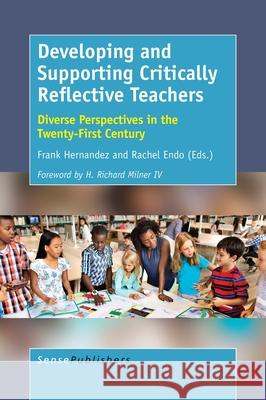Developing and Supporting Critically Reflective Teachers » książka
Developing and Supporting Critically Reflective Teachers
ISBN-13: 9789463009843 / Angielski / Miękka / 2017 / 126 str.
Developing and Supporting Critically Reflective Teachers
ISBN-13: 9789463009843 / Angielski / Miękka / 2017 / 126 str.
(netto: 153,79 VAT: 5%)
Najniższa cena z 30 dni: 154,06
ok. 22 dni roboczych.
Darmowa dostawa!
This collection centres the diverse narrative experiences of six early-career US teachers who identify as critically reflective practitioners. The contributors cogently demonstrate how teachers with critically reflective mindsets take active steps to ensure that they are cognizant of how their intersecting social identities impact how they arrive at making different types of decisions (big and small), interact with students from varied backgrounds, and negotiate competing demands and expectations in and out of their classrooms. The contributors have carefully thought about how learning and teaching are complex processes that involve significant ethical, moral, and social responsibilities. While they do not offer easy answers to the complex challenges that teachers negotiate on a daily basis, their willingness to share their concerns, experiences, and lesson learned offer timely perspectives about the possibilities and promise of using critical reflection as a means to challenge and close persistent academic, equity, and opportunity gaps that disproportionately and persistently impact students from underserved populations. The editors offer strategies for developing and supporting critically reflective teachers with a focus on transforming PK-12 and teacher education through an equity-centric lens. They contend that aspiring and earlier-career teachers greatly benefit from employing critical reflection in their daily lives to not only survive but to also thrive in an increasingly complex sociopolitical climate. Additional resources and guiding questions are included with specific foci on teacher educators and other major decision-makers in PK-12 education who are directly involved with the education, professional development, and socialization of early-career teachers.
This collection centres the diverse narrative experiences of six early-career US teachers who identify as critically reflective practitioners. The contributors cogently demonstrate how teachers with critically reflective mindsets take active steps to ensure that they are cognizant of how their intersecting social identities impact how they arrive at making different types of decisions (big and small), interact with students from varied backgrounds, and negotiate competing demands and expectations in and out of their classrooms.The contributors have carefully thought about how learning and teaching are complex processes that involve significant ethical, moral, and social responsibilities. While they do not offer easy answers to the complex challenges that teachers negotiate on a daily basis, their willingness to share their concerns, experiences, and lesson learned offer timely perspectives about the possibilities and promise of using critical reflection as a means to challenge and close persistent academic, equity, and opportunity gaps that disproportionately and persistently impact students from underserved populations.The editors offer strategies for developing and supporting critically reflective teachers with a focus on transforming PK-12 and teacher education through an equity-centric lens. They contend that aspiring and earlier-career teachers greatly benefit from employing critical reflection in their daily lives to not only survive but to also thrive in an increasingly complex sociopolitical climate. Additional resources and guiding questions are included with specific foci on teacher educators and other major decision-makers in PK-12 education who are directly involved with the education, professional development, and socialization of early-career teachers.











